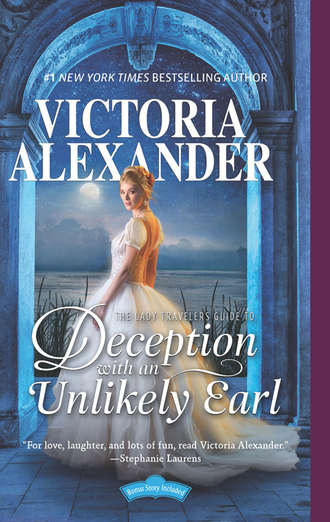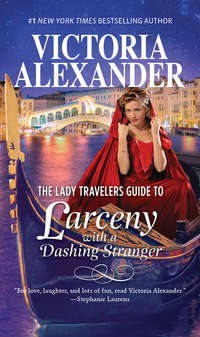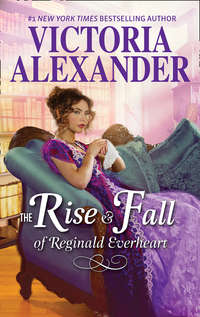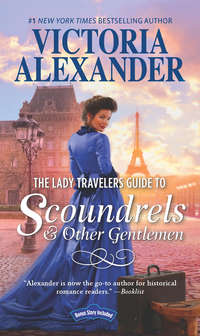
Полная версия
The Lady Traveller's Guide To Deception With An Unlikely Earl
“It is curious,” Gwen said diplomatically, “as well as to be expected.”
“Was there something in particular you wished to discuss?” Sidney closed the door, took off her coat, and placed it along with her hat and gloves in the cupboard, then perched on the edge of the bed. “I thought we had been quite thorough about our plans.”
“One can never be too prepared for deception,” Effie said firmly.
It did seem they had had endless discussions about how to make Sidney appear as if she was completely familiar with Egypt although none of them was certain exactly how to dampen Sidney’s expected enthusiasm. If they had decided anything at all it was to take their venture one day—one step—at a time.
“I don’t know why, but this feels rather delicate.” Effie glanced at the others then drew a deep breath. “It’s about your husband.”
Sidney stared. “My what?”
“Your husband,” Poppy said. “Your dead husband.”
Sidney laughed. “I don’t have a dead husband.
“We know that, dear. We wouldn’t be having this discussion if you did.” Gwen sighed. “We realized this morning that we had not discussed your husband—dear, dear whatever his name is.”
“He should at least have a name beyond Mr. Gordon,” Effie said. “Someone—Mr. Corbin or the buffoon or someone else entirely—might ask about him.”
“You are supposed to be a widow,” Gwen pointed out. “And widows generally have dead husbands.”
“Not you, of course,” Poppy added, “but most widows. We all do.”
“I had forgotten about the dead husband,” Sidney murmured. This was becoming more and more complicated but, as she wrote as Mrs. Gordon, it probably couldn’t be helped. Not for the first time did she regret the decision to write under an assumed name. It had been at Mr. Cadwallender’s insistence although he had initially proposed she write not as Miss Sidney Honeywell but as Mr. Sidney Gordon, which had struck her as being a traitor to her gender. However, she did agree to become Mrs. Gordon and while she’d never said she was a widow, the world assumed she was.
“You must never forget about the dead husband,” Effie warned. “And he needs a name you can remember.”
Sidney frowned. “I’m certain I’ll be able to remember his name.”
“You’re not very good at remembering names, dear. You do tend to be a bit scattered,” Poppy said gently. “What was your father’s name? You should be able to remember that.”
“My father’s name was Charles.”
Effie glanced at Gwen. “Unless you have any objections.”
“Because my husband’s name was Charles?” Gwen asked. “Don’t be absurd. The world is simply littered with Charleses, a fair number of them dead. Why, if I was bothered by every dead Charles I encountered, I would spend most of my time being out of sorts.” She cast Sidney an affectionate smile. “I daresay my husband would be honored to lend his name to your imaginary husband.” She grinned. “As long as he was handsome and dashing, of course.”
“Of course.” Effie turned to Sidney. “He was, wasn’t he?”
“Goodness, she wouldn’t have married him if he wasn’t. Not that a man’s appearance is as important as his character,” Poppy added quickly, “but, as we are inventing him, we might as well make him as attractive as we want. Or rather as Sidney wants.”
“I don’t see why not.” Effie nodded. “What did he look like, Sidney?”
“I don’t know.” Sidney crossed her arms over her chest. “And I don’t see why this is necessary.”
“Because someone might ask and you need to be prepared. It’s the details in a project like this that make all the difference between acceptance and being found out,” Gwen said firmly. “Now, tell us. What did he look like?”
“Very well.” Sidney sighed. This did seem absurd but the ladies probably had a point. “I suppose he was tall.” She had always thought tall men to be particularly attractive. “With nicely broad shoulders.”
“The result of a passion for out of door activities, no doubt.” Effie nodded. “Go on. What color hair and eyes did he have?”
Sidney thought for a moment. “Blue eyes, I think. No, better yet—gray. Which might seem nondescript but are really quite warm. Yes, that’s good. And they lit up when he smiled. He had a wonderful smile. And his hair...” One wouldn’t think making up a fraudulent husband would be quite this difficult. “Brown perhaps? A light brown.” No, not brown. What goes well with gray eyes? “Or... I know, a dark blond. The color of sand. Oh yes, that’s better. I like that. What do you think?”
All three ladies stared at her with the oddest expression on their faces.
“What is it?” Sidney drew her brows together. “Is he not handsome enough?”
“No, he’s fine,” Poppy said with a weak smile. What on earth was the matter with her?
Gwen cleared her throat. “Now tell us about your life together.”
“I thought we had discussed this as well. My story should be much like the one I created for Millicent.” Sidney sighed. “There really wasn’t much of a life together. I married Mr. Gordon—Charles—when I was eighteen—”
Poppy nodded. “He swept you off your feet.”
“And we immediately set off for Egypt as he was a promising, young archeologist—”
“An excellent place for a honeymoon.” Approval sounded in Effie’s voice.
“And I was determined to be by his side.”
“Most courageous of you,” Gwen said. “Go on.”
“We barely had a few months together before he died tragically.” Sidney paused. “Should I know how he died?”
“Well, you would wouldn’t you? As his wife.” Poppy glanced at the other ladies. “How shall we do away with him?”
“Perhaps a camel sat on him?” Gwen suggested.
“Or he could have drowned in the Nile.” Poppy brightened. “Yes, that’s good.” She fluttered her fingers. “Drowned and washed away never to be seen again.”
“Better yet.” Effie cast a triumphant smile at the others. “Egypt is full of vile creatures.” She glanced at Sidney. “Isn’t it?”
“Oh my, yes.” Sidney nodded. “There are several varieties of venomous snakes as well as scorpions and crocodiles—”
“That’s it!” Excitement rang in Effie’s voice. “Poor, dear, dashing Mr. Gordon was eaten by a crocodile!”
Poppy frowned. “That doesn’t sound very pleasant.”
“It doesn’t have to be pleasant.” Effie huffed. “It simply has to be fatal.”
“I know that,” Poppy said. “I just think it would be extremely difficult to move past the death of a husband if he were eaten by a crocodile.” She shook her head. “It’s not at all the kind of thing a woman could put behind her.” She shuddered.
“Which is precisely why,” Effie said slowly, “Sidney prefers not to discuss it. She has never truly recovered from his loss, you see.”
Gwen’s brow rose. “After almost fifteen years? They were hardly married any time at all.”
“Which makes it even more tragic,” Poppy said firmly. “He was, after all, her true love and in spite of the passage of time, she is still mourning—like Her Majesty.”
Sidney frowned. “Then shouldn’t I be wearing black?”
“Very well.” Effie cast Poppy an exasperated look. “Not exactly like the queen.”
“Still mourning the loss of Mr. Gordon,” Sidney said under her breath and nodded. “That sounds perfectly reasonable to me. However, in spite of my dreadful loss, I decided to stay on in Egypt because I couldn’t bear to return to London without poor Mr. Gordon and I felt it important to carry on with his work. Besides, I fell madly, deeply in love with the country and its history and its people.” That much was at least partially true. “Thus was the beginning of my adventures.”
“Excellent.” Poppy beamed.
“Well, fine, anyway.” Gwen cast her an encouraging smile.
“It will do,” Effie added then paused. “I think it might be best, all things considered, if we tried never to leave you alone with either the buffoon or Mr. Corbin.”
Sidney stared. “You don’t think I can do this?”
“Of course we do, dear,” Poppy said quickly. “It’s just that it’s been our observation that while you’re very good at writing, you’re not overly skilled at deception or—”
“Prevarication.” Gwen winced. “Or dishonesty or—”
“Lying,” Effie said bluntly. “You do not lie well, Sidney. Which is an admirable quality really, under most circumstances. However—” Effie grimaced “—these are not most circumstances.”
“I am well aware of that,” Sidney said. “I have given all of this a great deal of thought. Indeed, I’ve thought of little else since I agreed to be part of this farce. And yes, I have always prided myself on my sense of honesty.” She thought for a moment. “I am most grateful for your help and I daresay, I couldn’t manage this on my own but do not for a moment think I do not understand the importance of this venture. My reputation and my future are at stake. And in many ways, this is no one’s fault but my own.”
“Well, we were the ones who responded to Lord Brenton’s letters,” Poppy said faintly.
“Regardless, that’s not where this began.” Sidney drew a deep breath. “If I had paid more attention, I would have realized the world was taking my stories as fact and I could have taken steps to correct that impression. I should have taken a stand then, regardless of the consequences.”
Effie frowned. “But Mr. Cadwallender—”
“It’s my life and they’re my stories, Aunt Effie, and I should have stood up for both.” Sidney shook her head. “I allowed myself to be convinced by Mr. Cadwallender that my revealing the truth would be disastrous. As he was my publisher and a man, I assumed he knew best. In that, I believe now that I was wrong.”
Effie grinned.
“What I should have done scarcely matters now. Now I have a reputation to protect and a wrong to set right.” Sidney raised her chin. “In the eyes of my readers, I am Millicent Forester. I am the Queen of the Desert. I shall not let them down.”
“Excellent.” Gwen beamed.
“I absolutely will not allow an arrogant ass—”
“Or buffoon.” Poppy shrugged. “Both do seem accurate.”
“—to ruin my life, my future and my livelihood.” Determination washed through her. “This is a game I intend to win. I have a role to play, ladies. Mr. Armstrong is determined to prove I’m not what the world has been led to believe I am. All I have to do—” she squared her shoulders “—is prove him wrong.”
CHAPTER FIVE
“I SEE I’M not the only one who enjoys watching the sun rise over the ocean,” Harry said in his most cordial manner. It wasn’t easy. This was the first dawn of their voyage and cordial was the last thing he felt this morning toward this interloper.
“Good day, Mr. Armstrong.” Mrs. Gordon’s gaze remained on the horizon.
“I wouldn’t have taken you for such an early riser.” Perhaps she would scurry back to her cabin once she had fully absorbed the sunrise.
“What a remarkable coincidence, Mr. Armstrong,” she said coolly. “I would not have thought to encounter you at this time of day either.” She glanced at him. “Especially not with a bottle of champagne in your hand.”
“If I had known you were going to be here, I would have brought two glasses.”
“I never indulge in spirits before breakfast, Mr. Armstrong.”
“Perhaps you should, Mrs. Gordon.” He paused. He’d been trying for nearly a year now to be the kind of man he was expected to be—the kind of man an earl was supposed to be—and, even though she didn’t know of his title, he had decided not to reveal too much of his questionable past. Still, this was a fairly innocuous revelation. “When my friends and I first set off for Egypt, nearly twenty years ago, we marked the first sunrise of the first day with a bottle of the best champagne our collective resources could afford. Every voyage to Egypt after that, regardless of whether one or all three of us were traveling, we always greeted the first dawn with champagne. This bottle was delivered to my quarters before we left port from one of those friends.”
“That’s really quite charming.” She considered him thoughtfully. “I would not have thought you so sentimental.”
Rubbish. “I don’t think sentimental is the right word—”
“Habit, then.”
“I tend to think of it more in the manner of tradition.”
“Regardless, I do not wish to interfere.” She smiled. “I shall leave you to your tradition.” She turned to go.
“Join me,” he said without thinking.
She turned back to him, her eyes narrowed. “Why?”
“Why?” He grinned. “Are you always so suspicious?”
“No. In fact, I am quite trusting of most people. Trusting you, however—”
He winced. Not that he didn’t deserve her distrust.
“—does not strike me as especially wise. I would be remiss if I did not question your motives. We are here after all because you are determined to prove me a fraud and I am determined to prove you wrong.” She shrugged. “Under these circumstances, suspicion does seem the wiser course.”
“I’ll grant you that. However, just for the span of the sunrise, let us forget we are at odds. Do me the honor of joining me in the tradition of myself and my friends in a salute to what lies ahead. There is nothing as inspiring as watching the sun rise up out of the sea.”
“Very well.” Her eyes twinkled. “But you have only one glass.”
“Which I shall gladly sacrifice for the pleasure of your company.”
“How very gallant of you.”
“I can be very gallant. You should make note of that.” He opened the bottle, filled the glass and handed it to her, then raised the bottle toward the sun. “To the new day and the adventures it will bring.” And to those who are no longer with us, he added silently. He took a long drink from the bottle and sent a prayer of thanks to Ben. It was an excellent vintage, even straight from the bottle.
“To the adventures that lie ahead.” She raised her glass and took a sip, then wrinkled her nose.
“Is it not to your liking?”
“Oh no, it’s quite lovely really but the bubbles tickle my nose.” She fluttered her fingers in front of her nose. “Which is perhaps part of the enjoyment. I will confess I rarely have champagne and never in the morning. But it is delightful.”
“There is no better way to start a trip than with a glass of France’s finest.”
“And there is something both optimistic and invigorating about watching the sun make its first appearance of the day over the ocean. I agree with you, Mr. Armstrong.” She sipped her wine and turned her attention back to the sunrise. “The champagne makes it even better. I shall have to remember that. This is indeed an excellent way to start a grand adventure.”
“I must say I’m impressed. From reading your stories one would assume that the first dawn of a new journey toward Egypt would be rather commonplace for you. And yet you seem quite enthusiastic.”
“Would you prefer I be jaded and cynical as you appear to be?”
“I believe older and wiser a more accurate description,” he said coolly. “And I certainly didn’t mean to imply that you—”
“I daresay, Mr. Armstrong, you know nothing about me except for those details I have put in my stories.” She glanced at him. “And I try not to focus on my personal habits.”
“Why?” Curiosity sounded in his voice. “You are writing about your own adventures after all.”
“It’s very simple.” She turned toward him. “Regardless of whose adventures they are, my purpose isn’t to make readers admire the author but rather to become the hero or the heroine. Precisely why I chose to give the heroine of my stories a name different from my own. People cannot lose themselves in the story if they are too busy contemplating the author. Whether she is an early riser or prefers lemon to milk in her tea, it’s of no importance. All that matters is that people who read my stories forget the tedium of everyday life and lose themselves for an hour or an afternoon in another world.”
He stared at her for a long, disbelieving moment. “Rubbish, Mrs. Gordon. You can’t possibly be serious.”
“I most certainly am.”
“People don’t want to be swept away.” He scoffed. “People want to be informed and educated and enlightened.”
“Good Lord.” She laughed. “What utter nonsense. While indeed many people read newspapers, as well as books, to be informed and educated and enlightened, the vast majority of readers want nothing more than enjoyment.” She turned back to the sunrise.
“People want facts, Mrs. Gordon,” he said firmly. “Indisputable facts.”
“Do you really think people want to know that the Great Pyramid at Giza stands four hundred and eighty feet, nine inches high with a base very nearly square of 764 feet per side?”
“I find that extremely interesting.”
She ignored him. “Or would they prefer to read how the Great Pyramid rises into the heavens, dwarfing its companions as if they were insignificant interlopers and casting an ever growing shadow in the late afternoon sun, the hands of long-ago pharaohs, even in death, refusing to release their grip on their land and people and the Nile itself?”
“I will admit your way is certainly more inventive. It is not however, especially accurate.”
“No?” She heaved a resigned sigh, cast a longing look at the sunrise then faced him again. “Tell me, Mr. Armstrong.” She held out her glass. “Do the pyramids not cast a shadow in the setting sun that grows as sunset approaches and stretches toward the Nile?”
“One could say that, I suppose,” he said and filled her glass.
She raised a brow.
“I admit, the Nile is to the east of the pyramids.” He took another pull from the bottle. “And the setting sun does cast a significant shadow.”
“And does the Great Pyramid not tower over the others?”
“Yes, of course.”
“So what exactly was inaccurate?”
“Admittedly, inaccurate might have been the wrong word.” His jaw tightened. This was exactly the kind of problem he had with her writing. “Fanciful is perhaps a better word. The pyramids are tombs, not the fingers of the hands of the pharaohs reaching out from death.”
“My, you are stuffy.”
He stared at her. She was right—he did sound stuffy. He laughed.
“You find that amusing?”
He grinned. “No one has ever called me stuffy before.”
She shrugged. “Perhaps no one had the courage.”
“Entirely possible.” He chuckled. He never used to be stuffy. But then he’d never been an earl with property and wealth and responsibility before either.
“In spite of the imposing rhetoric in your uncle’s letters to The Times, and the threatening manner he used, you do not scare me, Mr. Armstrong.”
“Does my uncle?”
She met his gaze firmly. “No.”
“I don’t believe he intended to scare you, nor do I.” Although he certainly had expected her to retreat or even ignore his letters rather than respond to what he could now see might well have been construed as intimidating.
Mrs. Gordon cast him a knowing smile—although he wasn’t at all sure what she thought she knew and it was rather annoying—then returned to her perusal of the sunrise. As much as he had expected and wanted to be alone, he had to admit he was enjoying this bit of sparring with the lovely widow. He took another sip from the bottle. All things considered, this was probably a better way to begin this journey than drinking alone on deck accompanied only by the memories of friends who were gone or had moved on with their lives. The past was the past and both good times and bad were best left behind where they belonged.
“You must be pleased to be returning to Egypt,” he said in an offhand manner.
“Must I?”
“As much as I disagree with your manner of writing as well as dispute your depiction of, well, very nearly everything, I will not deny you do appear to have a certain passion for Egypt. So, I simply assume you are happy to be returning.”
“Indeed I am. It has been some time since I was last there.”
“How long?”
“Quite some time. Years, in fact.”
“How many?”
“A number of years.”
“Specifically?”
“Specifically? Come now, Mr. Armstrong.” She shook her head in annoyance. “It’s obvious that you are trying to solicit information from me although I must say you are not especially good at it.”
His brow furrowed. “Was I that obvious?”
She cast him a disbelieving look. “Yes.”
“Not subtle, then?”
“Not even a bit. Subtlety, Mr. Armstrong, is an art.”
“One I apparently need to work on.” He paused. “Although soliciting information was really not my intention. I intended nothing more than idle conversation, the same as one would have with any fellow passenger. The kind of thing people do when they’re sharing a sunrise and becoming better acquainted.”
“I have no desire to become better acquainted and we are not sharing a sunrise.”
“Oh, but I believe we are.” He nodded toward the east.
“Regardless, as your declared purpose is to prove me disreputable, I am not inclined to share even the most innocuous detail with you. Furthermore, you did say that for the length of the sunrise, we would ignore the dispute between us.”
He grinned, he couldn’t seem to help himself. “I believe the sun is now fully up.”
“Then there is no need for me to remain and be plied with champagne,” she said in a lofty manner.
He nodded and reached over to top off her glass. “No need at all.”
“It is, however, excellent champagne.”
“I can afford excellent champagne.”
“Do you have a great deal of money?”
“Enough.”
“But you haven’t always had money.” She studied him curiously. “You said on your first trip you had the best champagne you could afford.”
“True.”
“But you are now a wealthy man. Did you make your fortune in Egypt?”
“Now you too are trying to solicit information.”
“What a shocking coincidence.” She smiled pleasantly. “But it does seem only fair.”
“Very well.” He thought for a moment. Her queries were fairly harmless. “The response to your first comment is yes and the answer to the second is no.”
“Oh.” She considered him thoughtfully. “Mr. Corbin said you were well-known among Egyptologists and yet I have never heard of you.”
He bristled. “Have you heard of every Egyptologist?”
“Yes.”
“Surely not.
She raised a shoulder in an offhand shrug.
He stared. “You’re extremely outspoken, Mrs. Gordon.”
“Am I?” Surprise widened her eyes.
“Indeed you are.”
“Oh.” Her brows drew together, then her expression cleared and she cast him a brilliant smile. “Thank you.”
He shook his head in confusion. “For what?”
“For your assessment of my nature. I’ve never considered myself to be outspoken. I’m really quite flattered. You did mean it as a compliment, did you not?”
Why not? “Of course.”
“You do not lie well, Mr. Armstrong. It’s good to know.” She nodded. “But you do have my thanks for the champagne.” She leaned closer in a confidential manner and the merest hint of a scent at once exotic and welcoming wafted around him. “Did I tell you that I am not at all used to champagne?”
“Not directly but I suspected as much.” He bit back a grin. “Although I do find it difficult to believe that the celebrated Mrs. Gordon is not used to champagne.”
“Nonsense, I’m not the least bit celebrated. A bit well-known perhaps.”
“You are the Queen of the Desert after all.”
“Well yes, there is that.” She sipped her wine. “I do try to be circumspect.”
“But you are a member of the Antiquities Society.”
“I have not yet had the opportunity to attend any of the society’s gatherings. And if your uncle has his way, I never will.”
“Why not? The society is most prestigious.” So prestigious, it had never offered him membership.
“And membership is a great honor but I am far too wrapped up in my work to frequent social gatherings.”
“What? No literary society fetes? No grand balls in your honor?” He shook his head in a mournful manner. “I daresay I expected more from the Queen of the Desert.”






